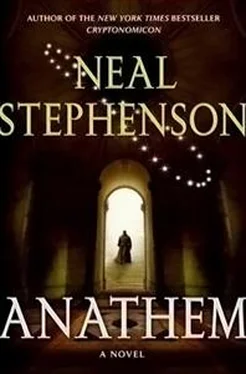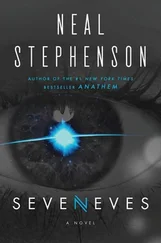“All these years reading the Chronicles and hearing strange tales told every day at Provener…I guess it sort of…”
“Raised our expectations,” he said.
“Yeah.” Something occurred to me: “Did Orolo ever talk to you about the Ten-thousanders?”
“Causal Domain Shear and all that?” Jesry looked at me funny, surprised that Orolo had confided in me.
I nodded.
“That is a classic example of the crap they feed us to make it seem more exciting than it really is.” But I sensed Jesry had only just decided this; if Orolo was talking to all the fids about it, how special could it be?
“They’re not feeding us crap, Jesry. It’s just that we live in boring times.”
He tried a new tack: “It’s a recruiting strategy. Or, to be precise, a retention strategy.”
“What does that mean?”
“Our only entertainment is waiting for the next Apert—to see what’s out there when the gates open. When the answer turns out to be the same crap except dirtier and uglier, what can we do besides sign up for another ten years and see if it’s any different next time?”
“Or go in deeper.”
“Become a Hundreder? Haven’t you realized that’s worthless for us?”
“Because their next Apert is our next Apert,” I said.
“And then we die before the next one after that.”
“It’s not that rare to live to 130,” I demurred. Which only proved that I had done the same calculation in my head and come to the same conclusion as Jesry. He snorted.
“You and I were born too early to be Hundreders and too late to be Thousanders. A couple of years earlier and we might have been foundlings and gone straight to the crag.”
“In which case we’d both die before seeing an Apert,” I said. “Besides, I might have been a foundling, but from what you’ve said of your birth family, I don’t think you’d have.”
“We’ll see soon enough,” he said.
We covered a mile in silence. Even though we didn’t say anything, we were in dialog: a peregrin dialog, meaning two equals wandering around trying to work something out, as opposed to a suvinian dialog where a fid is being taught by a mentor, or a Periklynian dialog, which is combat. The road dovetailed into a larger one lined with the mass-produced businesses where slines obtained food and stuff, enlivened by casinos: windowless industrial cubes wrapped in colored light. Back in some day when there had been more vehicles, the full width of the right-of-way had been claimed by striped lanes. Now there were a lot of pedestrians and people getting around on scooters and wheeled planks and pedal-powered contraptions. But instead of going in straight lines they, and we, had to stitch together routes joining the pavement slabs that surrounded the businesses as the sea surrounds a chain of islands. The slabs were riven with meandering cracks marked by knife-thin hedges of jumpweed that had been straining dirt and wrappers out of the wind for a long time. The sun had gone behind clouds shortly after dawn but now it came out again. We ducked into the shade of a business that sold tires of different colors to young men who wanted to prettify their fetches and their souped-up mobes, and spent a minute rearranging our bolts to protect our heads.
“You want something,” I said. “You’re grumpy you don’t have it yet. I don’t think that what you want is stuff, because you’ve paid no attention at all to any of this.” I jerked my head at a display of iridescent newmatter tires. Moving pictures of naked women with distended breasts came and went on the sides of the wheels.
Jesry watched one of the moving pictures for a while, then shrugged. “I suppose I could leave, and learn to like such things. Frankly it seems pretty stupid. Maybe it helps if you eat what they eat.”
We moved on across the pavement-slab. “Look,” I said, “it’s been understood at least since the Praxic Age that if you have enough allswell floating around in your bloodstream, your brain will tell you in a hundred different ways that everything is all right-”
“And if you don’t, you end up like you and me,” he said.
I tried to become angry, then surrendered with a laugh. “All right,” I said, “let’s go with that. A minute ago, we passed a stand of blithe in the median strip—”
“I saw it too, and the one by the pre-owned-pornography store.”
“That one looked fresher. We could go pick it and eat it, and eventually the level of allswell in our blood would go up and we could live out here, or anywhere, and feel happy. Or we could go back to the concent and try to come by our happiness honestly.”
“You are so gullible,” he said.
“ You’re supposed to be the Edharians’ golden boy,” I said, “ you’re supposed to be the one who swallows this stuff without question. I’m surprised, frankly.”
“And what are you now, Raz? The cynical Procian?”
“So people seem to think.”
“Look,” Jesry said, “I see the older avout working hard. Those who have upsight—who are illuminated by the light of Cnoüs”—he said this in a mocking tone; he was so frustrated that he veered and lunged in random ways as he moved from one thought to the next—“they do theorics. Those who aren’t so gifted fall back, and cut stone or keep bees. The really miserable ones leave, or throw themselves off the Mynster. Those who remain seem happy, whatever that means.”
“Certainly happier than the people out here.”
“I disagree,” Jesry said. “These people are as happy as, say, Fraa Orolo. They get what they want: naked ladies on their wheels. He gets what he wants: upsight to the mysteries of the universe.”
“Let’s get down to it then: what do you want?”
“Something to happen,” he said, “I almost don’t care what.”
“If you made a great advance in theorics, would that count?”
“Sure, but what are the odds I’ll do that?”
“It depends on the givens coming in from the observatories.”
“Right. So it’s out of my control. What do I do in the meantime?”
“Study theorics, which you’re so good at. Drink beer. Have Tivian liaisons with as many suurs as you can talk into it. Why is that so bad?”
He was devoting way too much attention to kicking a stone ahead of him, watching it bound across the pavement. “I keep looking at the shrimpy guys in the stained-glass windows,” he said.
“Huh?”
“You know. In the windows depicting the Saunts. The Saunts themselves, they’re always shown big. They fill most of the window. But if you look close, you can see tiny little figures in bolts and chords—”
“Huddled around their knees,” I said.
“Yeah. Looking up at the Saunt adoringly. The helpers. The fids. The second-raters who proved a lemma or read a draft somewhere along the way. No one knows their names, except maybe the cranky old fraa who takes care of that one window.”
“You don’t want to end up as a knee-hugger,” I said.
“That is correct. How does that work? Why some, but not others?”
“So, you want a window all to yourself?”
“It’d mean that something interesting happened to me,” he said, “something more interesting than this.”
“And if it came to a choice between that, and having enough allswell in your blood?”
He thought about that as we waited for a huge, articulated drummon to back out of our way.
“Finally you ask an interesting question,” he said.
And after that, he was quite a pleasant companion.
Half an hour later I pronounced us lost. Jesry accepted it with pleasure, as if this were more satisfactory than being found.
A boxy vehicle rolled past. “That is the third coach full of children that has gone by us recently,” Jesry pointed out. “Did you have a suvin in your neighborhood?”
Читать дальше





